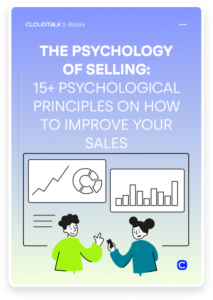8 most common sales objections & how to handle them

Dealing with sales objections is one of the hardest parts of a salesperson’s job. How can you prepare for them? Here are our tips.
If we lived in an ideal world, no salesperson would have to worry about overcoming sales objections. Your offer is exactly what your prospects need at the moment so they are immediately ready to make the purchase.
Sadly, we don’t live in the ideal world, so most of the time the call looks more like this: You find a prospect that seems to be a perfect candidate for your offer so you dial them up. The prospect answers the phone, only to bring up issues that prevent them from purchasing.
- I don’t see a need for this product right now
- I’m happy with the one I already have
- That’s too expensive for me
Sounds familiar? Those are the dreaded sales objections. What do you do when you are facing one of them? Give up? Nag the prospect into agreeing?
If you give up, you might not reach your quota. But if you pester the prospect, you might annoy them so much that they will blacklist you.
I recently had a conversation with salesperson from my current mobile phone operator that proved to be a perfect example of the latter. Mainly because the salesperson didn’t bother to respond to any of my sales objections.
She started out by trying to persuade me to purchase the most expensive mobile phone plan they had on offer. She said she’d include a home internet package as a “special bonus” just for me. Since the plan was much more expensive than my current one, I told her that I wasn’t interested.
Her response? Talking about various high-end phone models that I could get if agreed to her offer. Since that one didn’t work on me (I replaced my phone last year), she just kept insisting on me getting this and only this one offer.
I felt like she barely cared about what I needed. She just wanted to find someone who would agree to take the most expensive package possible.
Improve your sales with psychology-based principles

Now, if someone asked me why that salesperson failed to convince me, I could point out four major things:
- The salesperson didn’t listen to anything I told her but kept pushing her offer, even when I made it clear it’s too big and expensive for me.
- She didn’t try to focus on what I needed.
- The salesperson’s response to all my objections was either downplaying the price or saying that I’m sure to find her offer useful after a while of using it.
Was this the right way to respond to my concerns and expectations? Definitely not. That’s why is important to have strategic sales rebuttal formulas that might help agents to handle rejections and eventually increase performance.
But can you learn how to respond politely and effectively to various common sales objections? Absolutely! As a basis, you need four things:
- Listening: Listening to your prospects when they share their problems or issues.
- Understanding: Asking questions to try and understand your prospect’s point of view and concerns
- Responding: Respond with a solution to their objections or issue.
- Confirming: Making sure you and your prospect are on the same page by repeating back to them the details of the plan they’ve selected.
But since dealing with common sales objections can be pretty stressful, here’s something to help you. Let’s have a look at 5 common sales objections and how you should respond to them.
How to handle the most common objections in sales
#1 “It’s too expensive”
That’s the one objection in sales you surely hear most often. But did you ever think that the real reason might not be the lack of budget? Maybe the person simply doesn’t see your product/offer as a good enough value for the cost? If you could prove the product is worth its cost, you would be on a good way to close the sale. The worst thing you can do is keep defending the price in the meantime.
But first, you need to find out what exactly does the “It’s too expensive” mean for the prospect. So ask a few questions – a prospect will be usually more than happy to tell you exactly where the problem is.
When you know what the prospect really means by “It’s too expensive”, you can then think of a recommendation or a solution that will work for both of you.
#2 “We are already using another product/service”
This is one of the most common sales objections used – often straight at the start of a call. It’s tricky because if someone is really happy with a given product/service, they are not much likely to switch to another product.
But even if they aren’t satisfied, they might worry about the consequences of changing it for something new. You can persuade both groups to change their mind though if you show them why your product would be far more helpful for them than the one they currently have.
But to overcome this one challenge, you need to know more about the prospect and their needs. A good way to do that is to ask questions about what their current contract terms are and whether they are satisfied with the offer. Maybe there is something they would want to improve?
This is a great opportunity for you to show how your offer and product are different and how could it help them with solving that particular pain point of theirs. Another thing you could do is to take note of when their contract is ending and then calling them with an offer.
#3 “Just send me the information”
Now, you can see this objection in two ways. If you hear it straight at the beginning of the call, the prospect means it as a polite way of saying “I’m not interested”. Even if they say they will “call you later”, they probably won’t. I would suggest you think twice about whether this person is a good fit for the offer.
But there’s also the second type. Those are the prospects who want to read more about your offer before they make a decision. For example, during a call with a salesperson, I’m often asking for additional details. This is also a way for me to see isn’t there is something fishy about the offer.
If a salesperson asks me what kind of information I’m looking for and asks me to schedule a new call, I’m more than happy to agree. But there’s quite a number of salespeople who start insisting on me agreeing to the offer right now. For me, that looks either like desperation or trying to get me into something.
By asking questions to send a “custom-fit” offer to your prospect, you are showing you are serious about giving them the best offer, not just about making a quota.
CURIOUS TO SEE HOW YOU CAN CRUSH QUOTA, DESPITE SALES OBJECTIONS?
#4 “I don’t need it right now”
If a prospect says that they do not need your product or offer right now, for you it might sound like a firm “No”. But that’s not necessarily true. Maybe the prospect simply needs more convincing on why they need this product. But again, nagging them to take your offer or solution won’t work here.
You need to learn more about the prospect’s pain points, concerns, and priorities. A good way here is to first ask them about their needs or expectations and then show a way in which your offer/product could help them. Offering them a demo version of your product for trying it out also is a great idea.
#5 ”Where did you get my phone number from?”
Hopefully, you only call people who gave you their phone number willingly. But even then you might get a prospect who doesn’t remember he gave you their number. So first, inform them where you have their phone number from.
Another thing you should do in case the prospect doesn’t recognize you is to give them a description of what your company is doing and why you are calling them. Before getting to your product or offer details though, you should gauge if they are even interested in your company or offer.
There’s not much point in trying to sell your product to someone who completed a survey just for the one-time reward. If a prospect asks to remove their contact information from your database, respect their wish.
For more tips about how to handle this relatively tricky sales objection, check out our latest eBook about outbound sales.
#6 “I don’t have time to talk to you right now”
This one is rather simple, but many agents get it wrong. Many agents try to push past this sales objection, insisting that hearing a sales pitch it’ll only take a few moments of their time. More often than not, this type of strategy will annoy your prospect.
What you should do instead is ask your prospect when a good time for you to call back would be. This way, you’re showing your prospect that you respect their time while simultaneously securing a commitment from them that they’ll listen to your pitch at some point in the near future. It’s a win-win.
#7 “I need to run this past my boss”
You’ll often hear this one in the early stages of the salesmen-prospect relationship, when agents are still communicating with people at the lower rungs of a business. It’s a fair objection, to be sure: oftentimes entry level employees don’t have the authority to sign off on much of anything.
What you should do in this situation is give the person with whom you are speaking as much information and/or materials as possible so that they’re adequately armed for a conversation with their boss about your product. You should also try and another phone call with them for a few days later, after they’ve had the chance to talk with their boss about your product.
#8 “You have a bad review”
Bad reviews happen to every company, regardless of how excellent their product may or may not be. Customers can become disgruntled for all sorts of reasons, many of them having almost nothing to do with the quality of your product or service. If a prospect brings up a bad review, you should remind them of these facts, while also assuring them that whatever issue the bad review was about has been attended to and fixed.
The point here is to put your prospect’s mind at ease. Whatever issues happened in the past are in the past, and the product or service you are offering them today has been exorcised of all of the issues that may have plagued it in the past.
Overcoming sales objections over the phone
Sales objections are unavoidable and not every time you will manage to finish the call with a deal. What you can do to increase your chances is to listen, understand your prospect concerns, and look for a way to solve their problem. If you can do that, you are already one step closer to both make a sale and have a happy customer.























